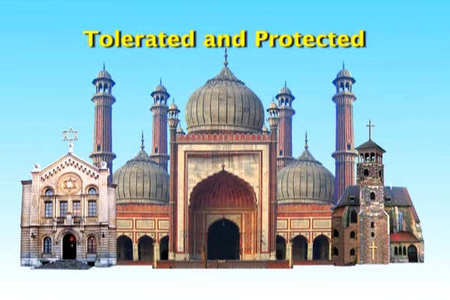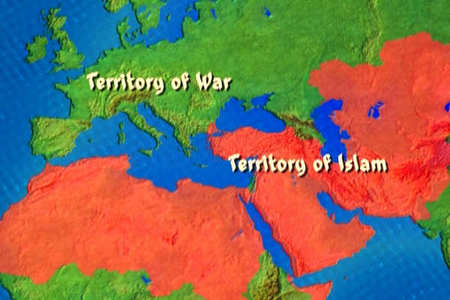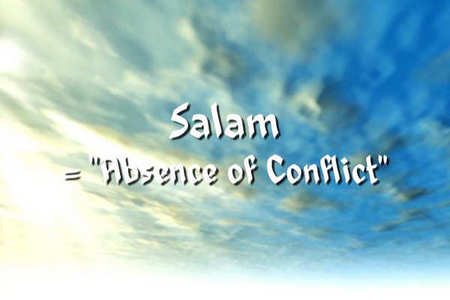Review of Farewell Israel
Introduction
One of the most important questions of our time, especially in the post 9/11 world, is how we view the world of Islam. The other important question, possibly of greater value, is how the world of Islam views us.
What do we know? Well we think we know certain things. Islam is a tolerant religion that harbours a number of fanatics that are labelled fundamentalists. We know that many Muslims hate Israel and would like to see it wiped from the map, to paraphrase Iranian President Ahmadinejad. We know that the problem of Muslim extremists is no longer a problem that is restricted to imports from the Middle East, conditions exists within Western democracies to breed in-grown extremists as evidenced by the attacks in London on July 7th 2005.
But what if the knowledge that we take for granted is flawed? What if we`re looking at this through Western eyes with Western ideals? What if we just have it all wrong? Joel Gilbert, better known for producing documentaries on Bob Dylan, brings us his latest film in an attempt to show the history of Islam and how they view the wider world. Gilbert has some expertise in this area; graduating from the University of London`s School of Oriental and African Studies and London School of Economics and Political Science with a BA in Economics and Politics in 1986, he studied under world-renowned Islamic history experts Professors Eli Keddouri, P.J. Vatikiotis, Michael Cooke, and Abbas Kelidar.
Farewell Israel is a history of Islam, from it`s earliest roots to the present times, marking each significant point in history that Gilbert believes shows an understanding of what Islam is trying to achieve, arguing that the West has failed to understand the motivations of Muslims and continues to view the religion from our own perspective and our own values rather than attempting to walk a mile in their shoes.
As well as a detailed history lesson, Gilbert also tries to educate us with dictionary type definitions of key words and phrases used by Muslims. A lot of the phraseology he uses is straight out of the Koran, but it`s broken down to it`s component parts in an easy to understand format so that even the most ignorant about Islam can walk away understanding just how Islam views the world and what it is trying to achieve. It`s a brave line that Gilbert takes and a vital one if we are to learn the lessons of the last few hundred years, let alone the last decade.
Starting with the Prophet Muhammad, we learn how the Jewish people rejected him in his message as the latest prophet of God, looking down on an Arab who believed he followed in the footsteps of Jesus. The Prophet Muhammad was devastated by this rejection and more so by that of his own people, although military victories in the years after slowly led to his beliefs and the religion of Islam taking a firm grip on the Arabs. Victory over the Jews eventually led to a vindication of Islam, with dominant Islamic rule for 1,200 years with Islamic rule stretching into the lower regions of Europe.
Then it started to go wrong. The European nations grew ever stronger but never really dominated Islam until the time of the Industrial Revolution. Machinery and mass production destroyed the economic advantage that Islam held with their time consuming hand crafted goods. Then the Western powers got Imperialist ideas and branched out into the Muslim world, colonialising large swathes of Islamic territory.
This has slowly been reversed but the 300 year decline in Islam has set the religion on a collision course with the Western powers over their attempts to restore Islam to its rightful place in the world according to their beliefs. Nowhere is this more obvious than the view of Islam to the creation of a Jewish homeland in Israel. Tensions in the Middle East have centred around Israel with bloody fighting and despite plenty of dialogue and attempts at accord, the region is as volatile as ever.
The USA was used to sitting on the sidelines and attempting to bring together various Arab leaders and whoever was heading the Israeli administration, but nothing in the way of permanent peace ever appeared. Then the attacks on the 9th September 2001 changed everything. From that point on, the USA took the lead in trying to take their brand of democracy to the Middle East, first invading Afghanistan and then Iraq, toppling both the Taliban and Saddam Hussein on the way. Despite predictions that both countries would welcome the chance to benefit from freedom as espoused by our brand of democracy, the situations in both countries are arguably worse than they`ve ever been. Just what has gone so terribly wrong?
Joel Gilbert thinks he has the answers…

Video
The chapter markings on this documentary are quite distinct, with the documentary `hosted` within a CGI representation of the Ishfahan complex in Iran, chosen due to it`s historic links with Islam. The camera moves between different rooms within the complex and each chapter emerges from a picture frame on the wall. It`s an interesting way of presenting the historical journey of Islam and one that works really well.

Audio
The soundtrack is presented in Dolby Digital 2.0 Stereo, no subtitling bar the burnt in subtitling for translating Arab speech into English. The distinctive Middle Eastern-tinged soundtrack was composed by keyboard player Wayne Peet and also features former bandmates of Bob Dylan (Scarlet Rivera - Violi, Rob Stoner - Bass, Vocals and Bruce Langhorne - Tambourin), who along with director Joel Gilbert on harmonica, form the Bob Dylan Tribute band Highway 61 Revisited.

Features
Theatrical Trailer
Islamic Art Review - moving montage of the Islamic artwork featured in the documentary already
Soundtrack music - in a move away from the norm, the soundtrack for this film is included on the DVD. You can either play it via your DVD player, although the mechanism for moving between tracks is clumsy to say the least) or you can download the mp3s directly onto your PC. Neat, huh? Wonder if the major studio`s will ever consider the same thing?

Conclusion
There are valuable lessons that need to be learnt in our dealings with Islam. The most important question being `do we understand what it is that they are searching for?` We are often taught that Islam is a religion of tolerance, and then we look at the chaos of the Middle East and the hatred in the eyes of those gatherings of muslims burning flags and chanting about death to non-believers and we can`t quite reconcile the two. The 9/11 atrocities just made it that much harder and tolerance is not quite the yardstick any more. The Western world is afraid. But do we really understand?
Joel Gilbert thinks not. He presents a fact based documentary that provides us with the history of Islam and defining moments in Islamic history and attempts to give us perspective from the Muslim point of view. Gilbert argues that Muslims don`t want to wipe all Israeli`s from the map, just the Israeli state. The reasoning for this comes far back in Islamic history. The Jews rejected and humiliated the Prophet Muhammad, who in turn beat them through military means. At this point, the expanding Muslim population allowed the Jews to live among them as a protected and tolerated race. They were looked down upon because they were wrong, they had rejected the word of the Prophet Muhammad. The Muslims recognise that their civilisation was one of the greatest of its time, reigning supreme for 1,200 years bringing forth military, scientific and philosophical advance. All these advances came about through the word and benevolence of God.
Then Islam went into decline, beaten militarily by the Christian world to begin with. The defeats led to Islam turning insular and trying to work out why God had deserted them, as the defeats were surely because the Muslims had lost their way and therefore God was displeased with them. The Muslims had to find their way again, but before they did, the ultimate insult was put upon them. In 1948, the Jewish state of Israel was formed and a race who were deemed to be inferior were placed on a level footing. What happened after this over the next couple of decades was much worse. Not only did the Israeli`s have their own state, but they turned out to be superior in military terms as well. Muslim thinkers were in a state of virtual apoplexy. Just how could this be?
Thus Gilbert argues that the 9/11 attacks were not an attack on the West or Western values but an attempt to draw President Bush and the United States into a trap by enticing him to attack an Arab country and thus incite the revolution needed to raise Islam back to the ways of the past and to reach the heady heights of their previous dominance. Is he right? Possibly (and actually for all the hype of the PR and the subtitle of the release, this is the only real part where Bush gets mentioned). It is clear that we don`t understand Islam and their way of thinking. It`s also clear that nothing we have done to bring the Western version of democracy to the Middle East has helped, Iraq just being the latest debacle. Muslims, argues Gilbert, just want to see Islam back to the way it used to be and the Israeli state (but not its people) is a huge obstacle to this goal and a humiliation for a people who believe fundamentally that they are superior.
This is an extremely well presented documentary, broken down into bite sized portions with detailed but short explanations. For someone who knows nothing or very little of Islam and the Middle East, it is a great introduction and helps to put things into perspective. But it`s only a start. The Islam viewpoint relayed here is a general view and we all know from human experience that views differ throughout groups and races of people. Thus the same must be true of Islam.
This documentary doesn`t contain all the answers, and I think that that was never the intention of Gilbert, but it does provide the viewer with the start they need to understand where Islam came from and some of the major moments in history that have influenced Islamic thinking. Where the viewer goes from there is entirely up to them. At just over two hours, it`s very long but I would guess is designed not only for repeat viewing but also block viewing. I watched this over four sessions, went back over a few sections and truly believe that I will watch it again. It`s a fantastic achievement in my eyes and hopefully may lead people to start trying to understand a religion that appears tolerant and extremist at the same time dependent on the direction you`re facing at a given moment.
Superb.
Your Opinions and Comments
Be the first to post a comment!